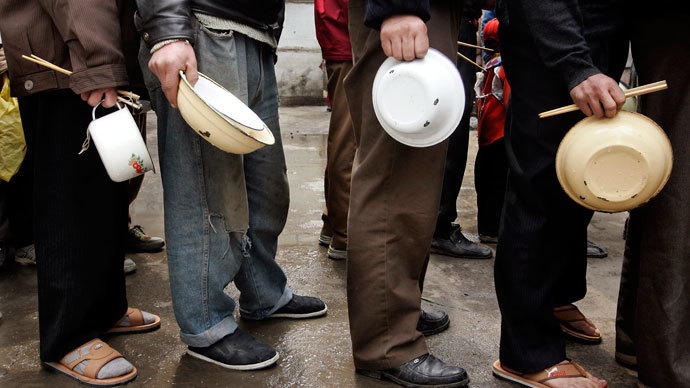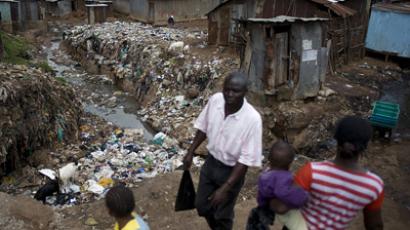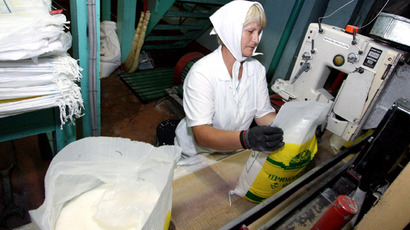Hungry China wants to 'borrow' land from 'bread basket' Ukraine for 50 years

The Chinese plan to lease 5 percent of Ukraine’s total land to grow crops may be nothing more than a pipe dream. Ukrainian officials say they know nothing of the deal, reported in a Chinese newspaper over the weekend.
Food demand in China is expected to grow along with industrialization, and China has been land-grabbing across the globe, with 7.4 million acres (3 million hectares) in Ukraine being the most recent prospect.
The South China Morning Post reported China’s Xinjiang Production and
Construction Corps (XPCC) had a 50-year plan for crop and pig
farming, spanning over 9 percent of Ukraine’s arable land.
If executed, the deal Kiev-based KSG agro would make Ukraine China's biggest overseas farming center.
However, in Kiev the proposal has caught officials by surprise.
Sergey Kasyanov, Chairman of KSG agro, explained the misunderstanding.
"We are not going to sell or transfer a lease or sublease to the Chinese. The project pertained to installing a drip irrigation system in those 3 million hectares in the next year,” Kasyanov told Vesti 24 in a TV interview.
China’s reported ‘land grab’ would include eastern territories near the Dnieper river, Kherson, and Crimea, well-known for its coastal beaches.
Ukraine lifted a ban on foreigners buying land last year.
“I don’t have any information on the subject, unfortunately. I know that Chinese companies occasionally show interest,” Igor Livin, the Chairman of the Association of the Ukrainian-Chinese Cooperation told Vesti 24.
Ukraine’s first deputy prime minister Sergey Arbuzov, who is on an official trip to China, confirmed Ukraine is interested in attracting new investment from China, but made no mention of agriculture, instead focused on banks.
On Monday, the Ukrainian Minister of Agriculture and Food said China and Ukraine will become strategic partners.
“The expansion of agricultural products delivered to China will help ensure that the total share of trade with China reaches between 20-25 percent,” said Mykola Prysyazhnyuk, Itar-Itass reported.
A Chinese-Ukrainian cooperation could help Kiev increase its international trade, while Beijing could reach its goal of becoming 95 percent self-sufficient in food.
"China has a lot of agriculture experience and Ukraine has rich resources and is willing to collaborate with China. Our two countries seem to complement each other,” Chen Yuztsin, of the Chinese Embassy in Ukraine, said.
Ukraine is home to 45 million people and boasts a gross domestic product of $176 billion. China’s population accounts for about a fifth of the global population, with at 1.4 billion people living in the country. It is also the world’s second largest economy, with over 8 trillion in GDP.
Land Grab
China has upped its overseas farming investments to counter any future food shortages, and in 2013 bought Australia’s biggest cotton farm. The Post reported China has over 2 million hectares of land abroad that it uses for agriculture.
Worldwide 115 million acres are leased to foreign investors.
Big foreign land buyers include Britain, the US, China, the UAE, South Korea, South Africa, Israel, India, and Egypt, according to a recent report from the ‘Proceedings of the National Academies of Sciences”. The study found between 0.7 and 1.75 percent of agricultural land is being transferred from local to foreign hands.
These countries are seeking greener pastures to grow crops in Congo, Sudan, Indonesia, Tanzania, Mozambique, Ethiopia, and Australia, according to the report.
‘Land grabbing’ can be a mutually beneficial relationship, as foreign investors can ‘get more’ out of the land using newer agriculture technology, and the local ‘host’ can profit. However, forcible relocation of people and soil erosion are risks.
Land has made a comeback – from cattle, private ski resorts, hunting and fishing clubs, to the Maine coastline – for American entrepreneurs who prefer to take a stake in natural real estate to diversify and hedge their assets against the risky gold, oil, and stock prices.
Rising grain prices also give investors incentive to turn to
land.














